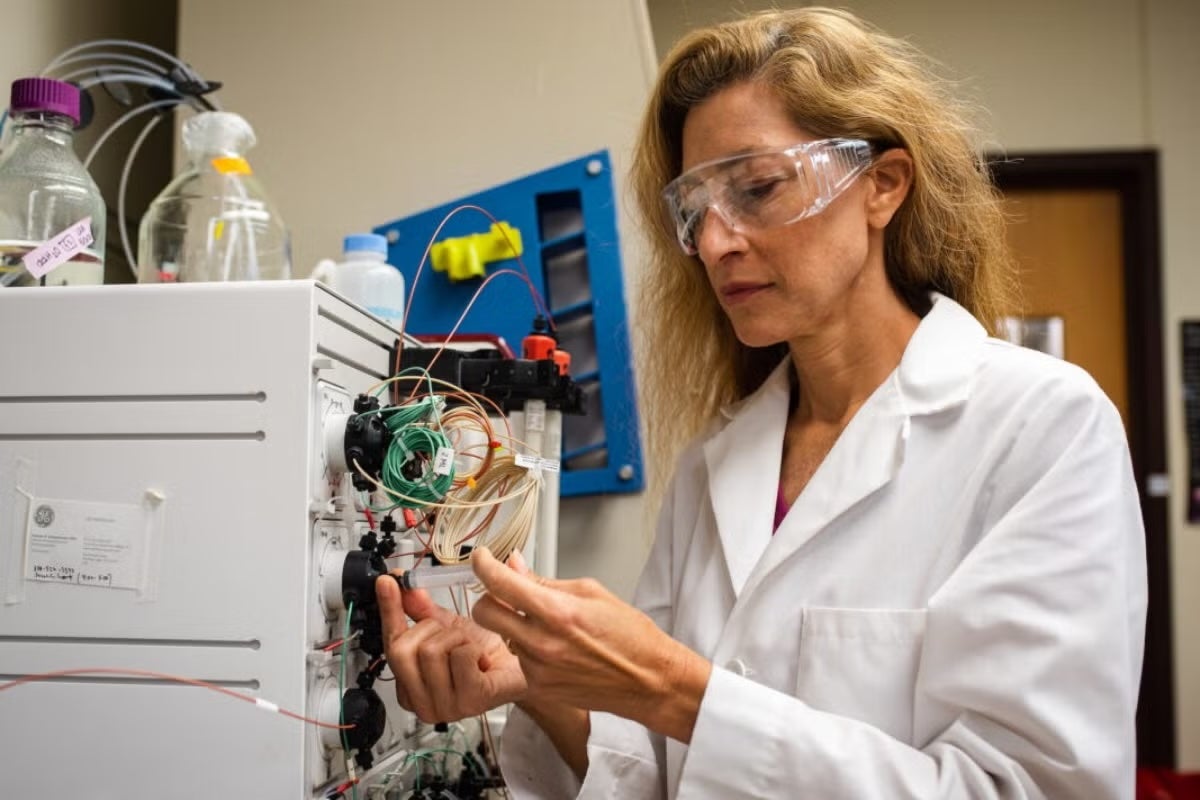How to Extend the Shelf Life of Fruits and Vegetables with Science
Hong Qiao, a plant researcher, explains the science behind produce ripening, and how anyone can prolong shelf life.

In order to maximize shelf life, there are strategies for storing produce. Illustration: Martha Morales
It’s been estimated that Americans throw out nearly half of the fruits and vegetables they buy. That’s a big waste of water, energy and money. According to Hong Qiao, a plant researcher and associate professor of molecular biosciences at UT Austin, a gaseous hormone called ethylene is partially responsible for wasted produce.
Fruits and vegetables that continue to produce ethylene after being harvested are known as climacteric, and they include things like bananas, apples and peaches. The ethylene prompts ripening, thus enhancing the flavor and softening the fruit. Non-climacteric plants — like grapes, blueberries and brussels sprouts — do not continue to ripen after being harvested because they produce very little ethylene, but some are sensitive to the hormone. Qiao, whose research focuses on the ways that plants use ethylene to adapt to environmental stress, sheds light on how to strategically store different types of fruits and vegetables to maximize shelf life.
Temperature regulation
Leaving climacteric items on the counter at room temperature facilitates an environment for them to fully ripen; this also enhances their flavor. When they ripen to your liking and you want to preserve them in that state for a bit longer, transferring them to the refrigerator inhibits ethylene production.
Non-climacteric fruits, however, are harvested when fully ripe. So, you might consider storing this produce in the refrigerator from the start to retain freshness and prevent bacterial growth. Some, like watermelons, can sit at room temperature for many days as long as they aren’t stored too close to ethylene-producing produce.
Be mindful of which fruits you store together
Importantly, Qiao said, if you are storing both climacteric and ethylene-sensitive items in the refrigerator, separating them in different drawers can maximize their freshness. The ethylene from climacteric produce accumulates in the surrounding air (in both the refrigerator and on the counter) which can lead to changes in the texture, color and flavor of ethylene-sensitive vegetables and fruits, potentially causing them to become limp, wilted, or overripe. A climacteric fruit, bananas produce relatively high amounts of ethylene.
“You will find that the apple which is closer to the banana will ripen faster than the apple which is farther from the banana,” Qiao said. “It’s better to separate produce.”
The ethylene from bananas stored together can even cause each other to ripen faster.
Bags may be burdensome
In an open air setting, the ethylene from climacteric fruits will dissipate throughout the room, and should not dramatically hinder the life span of surrounding ethylene-sensitive fruits. Conversely, storing climacteric produce in closed containers or bags can shorten shelf life (non-climacteric produce can be safely stored together in a bag, without ethylene-producing produce). This explains why supermarkets assemble most of the produce in the open.
“The bag makes it hard for the ethylene to leave. It will accumulate more and more, so of course: you are going to cause food spoilage,” Qiao said.
However, if you want your apple to ripen faster, storing it with a banana may do the trick.
Ethylene does more than ripen produce
Ethylene doesn’t just ripen fruits and vegetables. It is also used by plants to mitigate the effects of environmental stressors, such as heat, cold, drought or flooding. Qiao’s research is focused on this other aspect of ethylene to make crops more resistant to stress, allowing for higher yields and feeding the world's growing population.
Under stress, plants use ethylene to slow their growth and productivity. It’s a trade-off that can help them survive long enough to reproduce. But in a warming world with dwindling water for irrigation, this natural stress response threatens to reduce crop yields. Qiao and others are exploring ways to modify natural stress responses to minimize these growth/defense trade-offs.
“Texas is super hot. We really need water,” Qiao said. “If the plants cannot cooperate with this condition, then imagine how drastically the yield will shrink.”
A strategy for washing fruit
Supermarkets typically set up a “sprinkler system,” or a mist, for vegetables like lettuce and broccoli. According to Qiao, this method in combination with the store’s ventilation retains the vegetables’ freshness. In a more contained environment like a standard kitchen, such moisture may actually cause bacterial growth. So, at home, it is most favorable to store produce dry and wash it before it is eaten.
Looking for a more in-depth storage guide? The Washington State Department of Ecology provides a detailed chart outlining the recommended storage methods for a variety of produce items.



